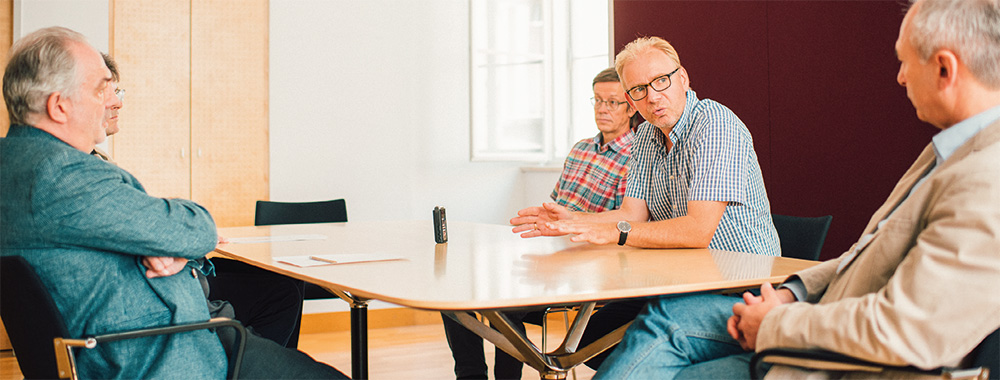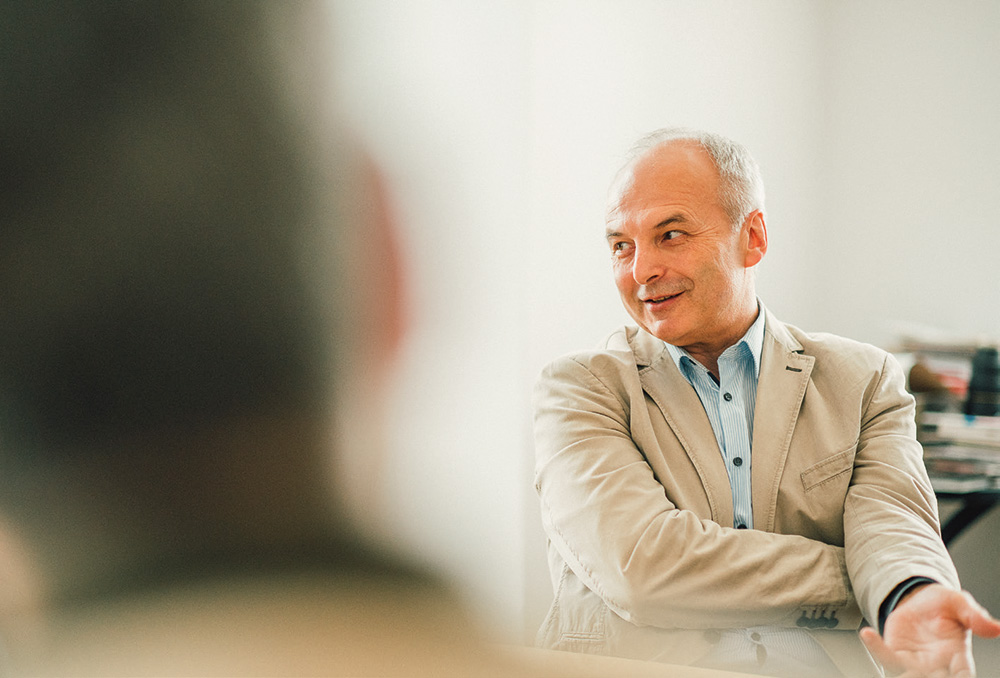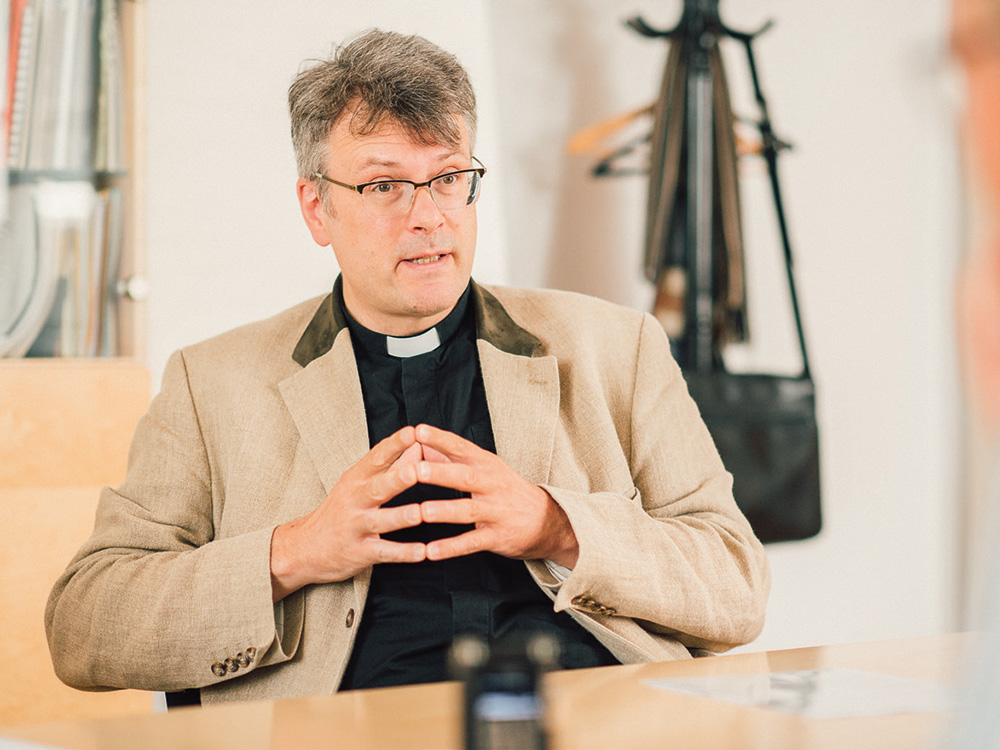The mdw’s Department of Organ, Organ Research, and Church Music is a place devoted to caring for the “humus of Western music”. Wolfgang Sauseng (department head), Johannes Ebenauer (deputy head), Matthias Krampe (head of church music for the Lutheran and Reformed Churches in Austria), and Konstantin Reymaier (head of the Archdiocese of Vienna’s Diocesan Department of Music) spoke with mdw Magazine.

A look at how your department is structured suggests that it serves a broad array of needs.
Wolfgang Sauseng (WS): We like to speak of our two “pillars”: keyboard and voice. It’s an idea that’s relevant right from the students’ entrance exams—you have to be able to sing and to play. In terms of instrumental music, our focus is of course on the organ as it’s played and taught. And in terms of the voice, we provide instruction in singing, choir directing, and Gregorian chant. These focuses are rounded out by improvisation, composition, musicology (in the Gregorian chant context), hymnology, liturgy, and organ research. So it more or less reflects the entire church music field, and it’s certainly one of the mdw’s most comprehensive programs of study. Or to put it in botanical terms: it’s not some exotic plant of a degree programme, but rather concerned with tending the very humus in which Western art music developed.

The Department is also ecumenically structured in that it provides training to both Catholic and Protestant church musicians. What’s important from a Protestant standpoint?
Matthias Krampe (MK): For us, one thing that’s important is being oriented toward what’s going on at German places of training. We take into account changes that happen there in order to ensure that student exchanges within the German-speaking region remain feasible in terms of curricula and the mutual recognition of coursework. And the job requirements of the German Protestant Church’s state organisations are of course also very important. One point here is how the profession’s scope of activity in Germany is currently seeing a massive expansion towards popular music.

So you react to such requirements as a department?
Johannes Ebenbauer (JE): The simple fact that the styles represented in the official church hymnals (Gotteslob [Catholic] und Evangelisches Gesangsbuch [Protestant]) range from Gregorian chant to “contemporary worship music” means that you have to be able to provide appropriate accompaniments for all those things on the organ as well as to arrange it for instrumental ensembles.
WS: Some students are really interested in learning all that, while others aren’t at all—they might be more interested in, say, twelve-tone music. So in teaching my composing courses, I’m flexible and always strive to address the various interests.

What’s your assessment of what the individual parishes need and want?
Konstantin Reymaier (KR): We see huge differences, there. Some parishes put on a classical orchestral mass almost every Sunday, while others place zero value on music. Unfortunately, it’s generally the case that there’s just no comparison between Austria’s Catholic Church and its Protestant church music activities—or the situation in Germany, for that matter—in terms of available budgets. Apart from that, we’re also seeing less and less choirs and traditional music but more and more bands. Which is something I do understand, since the music in a given church always needs to be connected with the life of its congregation. So this is an extremely important field of teaching for the diocesan conservatories. But here at the mdw’s Department of Church Music, I perceive our job as being to care for and nourish our gigantic treasury of traditional Western church music—because its loss would threaten the very roots of our European identity.
JE: As far as these roots go, we represent a central node at the mdw that’s unique in several respects: we begin with Gregorian chant and early polyphony and continue through the Renaissance and the early baroque period—which, in actual practice, is absent or barely a topic anywhere else, as far as I know. And then there’s the classical mass and oratorio literature, which are covered mainly by our department—to say nothing of the sacred music of the 20th and 21st centuries. I think there’s far too little knowledge and awareness of this at the University.
Our main point of contact with the mdw’s other departments is in the area of Instrumental and Voice Education (IGP), because we’re the only department with both performance- and education-related majors. Particularly in terms of teacher training, I think there’s a broad field of possibilities. Austria has nowhere near the number of jobs for church musicians that, for example, Germany has. But if they’re willing to relocate there, graduates of our department absolutely can find good opportunities. Above and beyond that, I see a major area of future activity for us having to do with music schools and diocesan conservatories. Just one example: Helmut Traxler-Turner studied church music and flute (IGP) and is now director of the music school in Kapfenberg. He also conducts that town’s symphony orchestra in its own hall, and Kapfenberg’s Stadtpfarrkirche recently got a new things! And there’s also our very successful graduate Bine Katrine Bryndorf, whose current activities include working a professor at the Royal Academy of Music in London [See “Alumni in Focus”—Ed.].

Since you just touched on it: How good are one’s general chances of finding work after graduation?
WS: Over the past five or six years, our alumni with master’s degrees have been landing in really good jobs. Take Marco Paolacci: he’s now the organist at Zwettl Abbey, where he’s built up an amazing music programme over the past two years.
JE: You do actually have to react to job announcements, of course. And in many cases, such jobs will entail that you change your place of residence. But as long as that’s compatible with your life planning, it’ll work.
KR: I do agree that it’s possible to find work. We see monasteries, cathedrals, and parishes announcing jobs—including full-time jobs, even if there aren’t that many of those. And there are also cases where musicians have more or less created their own jobs.
But let’s say you invest tons of sweat, emotion, and charisma in building up some truly lively musical activities at some church. Will its priest or minister ultimately be willing to pay you?
KR: It’ll rarely be a full-time position at a single church. I’m currently trying to put that kind of thing on firmer ground as part of the current restructuring of our parish financing system. But even so, it will still depend on the initiative and active dedication of the individuals in question.
MK: In the protestant dioceses, we’ve been able to create several well-paid positions financed in the most diverse ways over the past several years—which is a huge bit of progress. In doing so, our central idea was: “Church music is essential for a church that’s devoted to its missionary role!” We won’t be able to expand beyond that in the near term, though it will be possible to mount a few projects. On the other hand, and still speaking from a Protestant standpoint, the German market with its full-time positions is particularly attractive because the pay there is consistently better than it is in the Catholic context.
WS: And continuing from that thought, I’ve heard that our level of training in terms of choir direction and organ playing is one of the best internationally. And we have a rectorate team that stands behind us and supports our mission of caring for and passing on the totality of Western musical culture. Our choir directing students are able to gather experience with top-notch ensembles to an extent that’s impossible anywhere else, and the extraordinarily high quality of our in-house “organ fleet”—plus all the outstanding organs in Vienna’s inner districts to which we also have access—is something we hear praise for even from beyond the confines of Austria.

